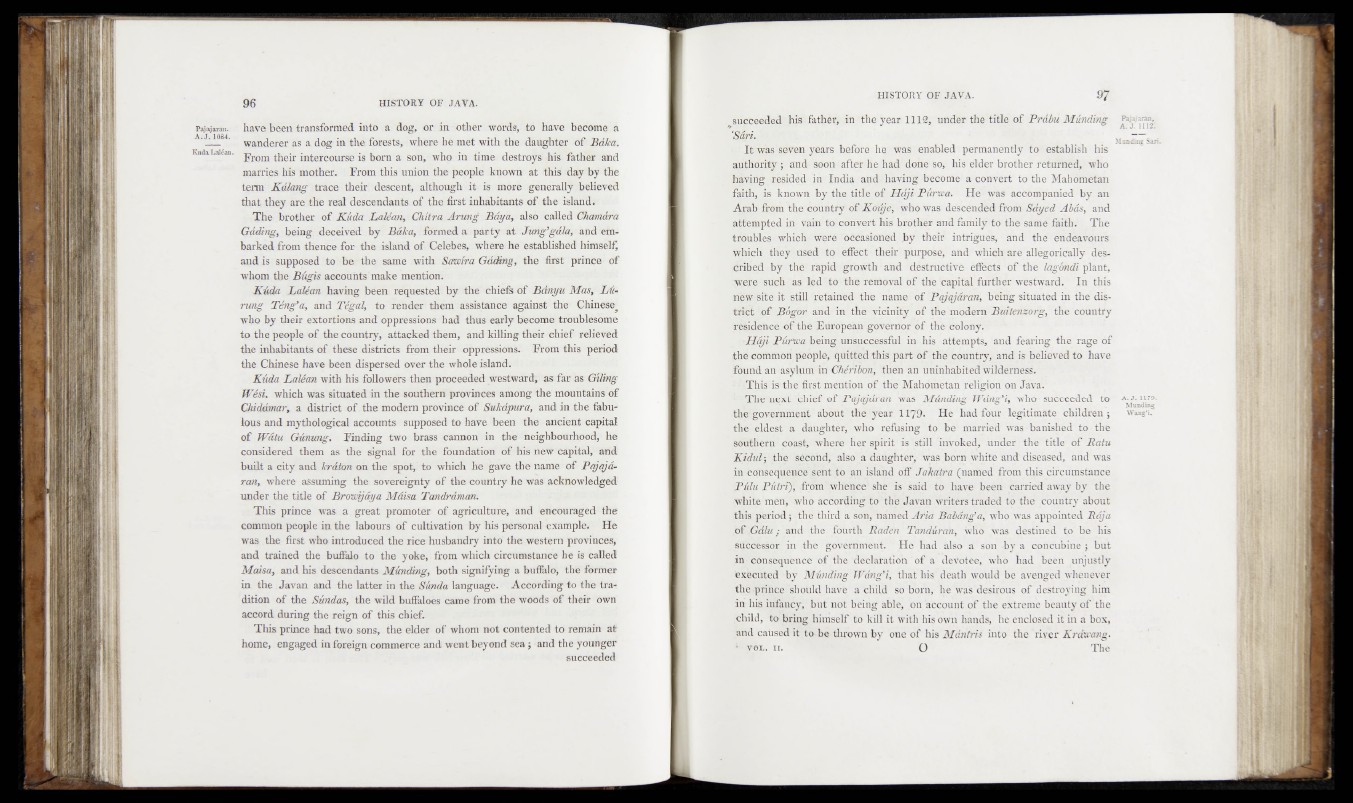
96 HISTORY OF JAYA.
Pajajaran.
j p 10.84.
KudaLaléau.
have been transformed into a dog, or in other words, to have become a
wanderer as a dog in the forests, where he met with the daughter of Bdka.
From their intercourse is bora a son, who in time destroys, his father and
marries his mother. From this union the people known at this day by the
term Kalang trace their descent, although it is more generally1 believed
that they are the real descendants of the first inhabitants of the island.
The brother of Küda LaMan, Chitra Arung Bdya, also called Chamdra
Gading, being' deceived by Baku,. formed a party at Jtmg’gdla, and em*
barked from thence for the island of Celebes, where he established himself)
and is supposed to be the same with Samira Gading, the first prince of
whom the Bügis accounts make mention.
Küda LaMan having been requested, by the chiefs of Bdnyu Mas, IM-
rung Téngfa, and Têgal, to render them assistance against the Chinese^
who by their extortions and oppressions had thus early become troublesome
to the people of the country, attacked them, and killing their chief relieved
the inhabitants of these districts from their oppressions. From this period
the Chinese have been dispersed over the whole island.
Küda LaUan with his followers then proceeded westward, as far as Gilmg
Wést, which was situated in the southern provinces among the mountains of
Chiddmar, a district of the modern province of Sukdpura, and in the fabulous
and mythological accounts supposed to have been the ancient capital
of Wdtu Gunung. Finding two brass cannon in the neighbourhood, he
considered them as the signal for the foundation of his new capital, and
built a city and krdtan oh the spot, to which he gave the name of Pqjajd-
ran, where assuming the sovereignty of the country he was acknowledged
under the title of Browjdya Mdisa Tandrdmatn.
This prince was a great promoter of agriculture, and eheouraged the
common people in the labours of cultivation by Ms personal example. He
was the first who introduced the rice husbandry into the western provinces,
and trained the buffalo to the yoke, from which circumstance he is called
Maisa, and his descendants Monding, both signifying a buffalo, the former
in the Javan and the latter, in the Sünda language. According to the tradition
of the jSundas, the wild buffaloes came from the woods of their own
accord during the reign of this chief.
This prince had two sons, the elder of whom not contented to remain at
home, engaged in foreign commerce and went beyond sea; and the younger
succeeded
succeeded his father, in the year 1112, under the title of Prdbu Mdnding
'Sjdfi.
' It was seven years before he. was enabled permanently to establish his
a u th o r i ty ; and soon after he had done so, his elder brother returned, who
having resided in India and having-'become^ a convert to the Mahometan
faith, is known by the title of Hdji Ftirwa. lie was accompanied by an
Arab from the country of Kotije, who was descended from Sdyed Abas, and
attempted in vain to convert his brother and family to the same faith. The
troubles’which-’^ere’occasioned .by their intrigues^ and the endeavours
which they used to effect their purpose, and which are allegorically described
by the rapid growth and destructive effects of the lagondi plant,
tyrere: such as led' to the removal of the capital further westward. In this
new-site it still retained the name of Pajajaran, being situated in the district
}bf Bog'or and in the vicinity of the modern Bmtenzorg, the countfy
•residence of the European governor of the colony.
■ 'Hcyi Parma being unsuccessful in his attempts, and fearing the rage of
(the common people, quitted this part of the country, and is believed to have
■ found an asylum dtf Ghertbon-, then an uninhabited wilderness.
Jf;ThisiiS'the first mention of the Mahometan religion on Java.
The next chief of Pajajdran was Munding Wang’ i, who • succeeded to
thelgovernmeht about the year 1 1 7 9 . lie had four legitimate children j
the eldest a daughter, who refusing to be married was ■ banished to the
southern coast, where her spirit is still invoked, under the title of liatu
Kiduh, the second, also a daughter, was born white and' diseased, and was
in consequence'jSent to an island off Jakdira (named from this circumstance
Ptdu P&trjj, from .whence1 she is said to have been carried away by the
white men, .who according to ’ the Javan writers traded to the country about
this period; the third a son, named Aria Babang’a, who was appointed Raja
of ,Gdlu ƒ and the fourth Baden Tandurah, who was destined to be Ms
, successor in the government. He had also a son -by a concubine; but
in- consequence of the declaration ' of a devotee, who had been unjustly
executed by Mdnding Wdng'i, that his' death would be avenged whenever
the prince should have a child so born, he was desirous of destroying him
in his infancy, but not being able, on account of the extreme beauty of the
.child, to bring himself to kill it with his own hands, he enclosed it in a box,
and caused it to be thrown by one of his Mdntris into the river KrAmong.
VOL, ix. O The
Pajajaran,
A. J. IW&
Monding Sar
A. J. 1179.
Monding
Wang*u